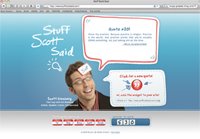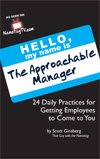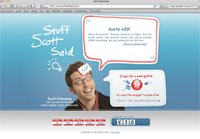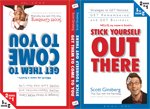 1. Brainstorming is the great time-waster. You don’t need another meeting. You don’t need another conference call. And you don’t need to spend another afternoon talking the life out of your idea. You need to take massive action. Today.
1. Brainstorming is the great time-waster. You don’t need another meeting. You don’t need another conference call. And you don’t need to spend another afternoon talking the life out of your idea. You need to take massive action. Today.
Otherwise you’ll get hooked on the addictive power of brainstorming – when what you REALLY need is to smoke the sweet cheeba of execution. What consumes your time but isn’t making you any money?
2. Creativity the best therapy. Tell your shrink you won’t be coming in today. Next time you feel anxious, sick, frustrated (insert negative emotion here), don’t TAKE something, i.e., pills – go MAKE something. Anything. Doesn’t matter what. When you channel your energy into the creative process and enter into flow state, you’ll forget all about that pesky stomach cramp.
Try it. Every single day, spend at least fifteen minutes making something out of nothing. I absolutely guarantee you will feel better. And if you don’t, draw a picture of how stupid I am, then send it to me. What are you turning your problems into?
3. Creativity without innovation is useless. Sure, creativity is fun and cool and healthy for the soul, but there comes a point when you need to stop thinking and start executing. To make that crucial transition from brainstorming to brain monetizing.
Because there’s a HUGE distinction between creativity and innovation: One is a state of being – the other is a practice of doing. Both are essential, but neither can sustain you alone. Are you an “idea guy” or an “execution guy”?
4. Inspiration is the great illusion. If you sit around waiting for inspiration, the only thing that will ever come to you is lower back pain. That’s not the way creativity works. You can’t force inspiration.
You can only live your life in a conscious, creative and adventurous way – listen carefully to everything that happens to you through the filter of your Theory of the Universe – and then render what wants to be written in a disciplined, organized way.
You’ll soon discover that venturesomeness truly is the best idea-generator. And you’ll never have a creative block again. When was the last time you made the choice to be inspired?
5. Lack of discipline atrophies creativity. Inspiration is overrated. If you want to make Idea Lightning strike, you need to make yourself a more strikeable person. And the primary technique for doing so is to cultivate creative discipline. To make yourself sit down at the workbench at the same time, every day, ready to create.
As a writer, I call this being “due at the page.” That way, every morning at 5AM when I sit down to work, lightning strikes. Because everything yields to diligence. What awaits you in the refining fire of discipline?
6. Wisdom without distribution is wasteful. What you scatter is more important than what you gather. And hording wisdom without circulation is a dangerous act of selfishness. Now, that doesn’t mean you need to publish or share every single thought you’ve ever had.
But if you’re debating whether or not to tell the world, ask yourself, “What’s the worst thing that could happen if I distribute this idea?” Odds are, the answer won’t be as detrimental as you think. Are you being selfish with your wisdom?
LET ME ASK YA THIS…
What are you listening to?
LET ME SUGGEST THIS…
For the list called, “9 Things Every Writer Needs to Do Every Day,” send an email to me, and you win the list for free!
* * * *
Scott Ginsberg
That Guy with the Nametag
Author, Speaker, Coach, Entrepreneur
[email protected]
 Need to build your Thought Leadership Platform?
Need to build your Thought Leadership Platform?
Perhaps my monthly (or yearly) coaching program would help.
Rent Scott’s Brain today!

 1. Prepare yourself to be promotable. First, shift from an attitude of need to an attitude of want. It’s healthier, more attractive and good practice surrendering. Second, acknowledge your own value. If you don’t, nobody else will. Third, exercise a high degree of conscious control in creating the career you want.
1. Prepare yourself to be promotable. First, shift from an attitude of need to an attitude of want. It’s healthier, more attractive and good practice surrendering. Second, acknowledge your own value. If you don’t, nobody else will. Third, exercise a high degree of conscious control in creating the career you want. 
 1. Abundance of competition indicates unoriginality. If you’re truly unique, the only one who does what you do – the WAY that you do it – then no second-rate, chump-ass imitation should be able to hurt you. Screw the competition. Just because they’re there doesn’t mean you can’t beat them. What do you do that brings people back for more of YOU?
1. Abundance of competition indicates unoriginality. If you’re truly unique, the only one who does what you do – the WAY that you do it – then no second-rate, chump-ass imitation should be able to hurt you. Screw the competition. Just because they’re there doesn’t mean you can’t beat them. What do you do that brings people back for more of YOU? Who’s quoting YOU?
Who’s quoting YOU? 1. Behavior is the broadcaster of attitude. Don’t bother announcing to people what kind of attitude you strive to maintain. Anyone who’s even (somewhat) perceptive can already tell. And here’s why: Bodies override mouths, verbs outweigh nouns and actions embody mindsets.
1. Behavior is the broadcaster of attitude. Don’t bother announcing to people what kind of attitude you strive to maintain. Anyone who’s even (somewhat) perceptive can already tell. And here’s why: Bodies override mouths, verbs outweigh nouns and actions embody mindsets. 
 1. Hissing is the echo of awesomeness. Accept the fact that approximately ten percent of the people you encounter in life will not like you. Get over it. Screw the ten and stick with the ninety. Pick a side, put a stake in the ground and polarize people purposely.
1. Hissing is the echo of awesomeness. Accept the fact that approximately ten percent of the people you encounter in life will not like you. Get over it. Screw the ten and stick with the ninety. Pick a side, put a stake in the ground and polarize people purposely.  When you’re not coachable, you’re not able to see yourself fully and objectively.
When you’re not coachable, you’re not able to see yourself fully and objectively. 1. Abandonment is the backbone of entrepreneurship. By definition, an entrepreneur is someone who undertakes and manages risk. Someone vulnerable. Someone courageous enough to stick herself out there.
1. Abandonment is the backbone of entrepreneurship. By definition, an entrepreneur is someone who undertakes and manages risk. Someone vulnerable. Someone courageous enough to stick herself out there.  Who’s quoting YOU?
Who’s quoting YOU? 1. What are you doing to become even more visible?
1. What are you doing to become even more visible? The world’s FIRST two-in-one, flip-flop book!
The world’s FIRST two-in-one, flip-flop book!